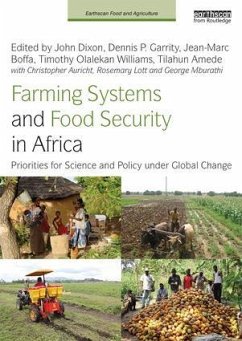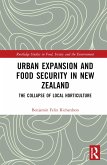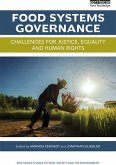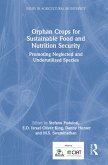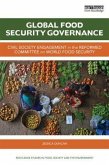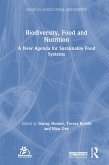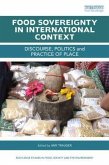Farming Systems and Food Security in Africa
Priorities for Science and Policy Under Global Change
Herausgeber: Dixon, John; Boffa, Jean-Marc; Garrity, Dennis P.
Farming Systems and Food Security in Africa
Priorities for Science and Policy Under Global Change
Herausgeber: Dixon, John; Boffa, Jean-Marc; Garrity, Dennis P.
- Gebundenes Buch
- Merkliste
- Auf die Merkliste
- Bewerten Bewerten
- Teilen
- Produkt teilen
- Produkterinnerung
- Produkterinnerung
This book systematically and comprehensively describes and classifies the characteristics, trends, drivers of change and strategic priorities for each of thirteen African farming systems and their main subsystems.
Andere Kunden interessierten sich auch für
![Urban Expansion and Food Security in New Zealand Urban Expansion and Food Security in New Zealand]() Benjamin Felix RichardsonUrban Expansion and Food Security in New Zealand198,99 €
Benjamin Felix RichardsonUrban Expansion and Food Security in New Zealand198,99 €![Food Systems Governance Food Systems Governance]() Food Systems Governance220,99 €
Food Systems Governance220,99 €![Orphan Crops for Sustainable Food and Nutrition Security Orphan Crops for Sustainable Food and Nutrition Security]() Orphan Crops for Sustainable Food and Nutrition Security199,99 €
Orphan Crops for Sustainable Food and Nutrition Security199,99 €![Global Food Security Governance Global Food Security Governance]() Jessica DuncanGlobal Food Security Governance209,99 €
Jessica DuncanGlobal Food Security Governance209,99 €![Biodiversity, Food and Nutrition Biodiversity, Food and Nutrition]() Biodiversity, Food and Nutrition199,99 €
Biodiversity, Food and Nutrition199,99 €![Securitizing Marine Protected Areas Securitizing Marine Protected Areas]() Elizabeth M. De SantoSecuritizing Marine Protected Areas198,99 €
Elizabeth M. De SantoSecuritizing Marine Protected Areas198,99 €![Food Sovereignty in International Context Food Sovereignty in International Context]() Food Sovereignty in International Context209,99 €
Food Sovereignty in International Context209,99 €-
-
-
This book systematically and comprehensively describes and classifies the characteristics, trends, drivers of change and strategic priorities for each of thirteen African farming systems and their main subsystems.
Hinweis: Dieser Artikel kann nur an eine deutsche Lieferadresse ausgeliefert werden.
Hinweis: Dieser Artikel kann nur an eine deutsche Lieferadresse ausgeliefert werden.
Produktdetails
- Produktdetails
- Verlag: Routledge
- Seitenzahl: 676
- Erscheinungstermin: 18. Dezember 2019
- Englisch
- Abmessung: 250mm x 175mm x 40mm
- Gewicht: 1327g
- ISBN-13: 9781138963351
- ISBN-10: 1138963356
- Artikelnr.: 58440873
- Herstellerkennzeichnung
- Libri GmbH
- Europaallee 1
- 36244 Bad Hersfeld
- gpsr@libri.de
- Verlag: Routledge
- Seitenzahl: 676
- Erscheinungstermin: 18. Dezember 2019
- Englisch
- Abmessung: 250mm x 175mm x 40mm
- Gewicht: 1327g
- ISBN-13: 9781138963351
- ISBN-10: 1138963356
- Artikelnr.: 58440873
- Herstellerkennzeichnung
- Libri GmbH
- Europaallee 1
- 36244 Bad Hersfeld
- gpsr@libri.de
John Dixon is Principal Adviser Research & Program Manager, Cropping Systems and Economics, Australian Centre for International Agricultural Research (ACIAR), Canberra, Australia. Dennis Garrity is Senior Fellow at the World Agroforestry Centre (ICRAF), based in Nairobi, Kenya, UNCCD Drylands Ambassador, and Chair of the EverGreen Agriculture Partnership. Jean-Marc Boffa is Director of Terra Sana Projects and Associate Fellow of the World Agroforestry Centre (ICRAF), Nairobi, Kenya. Timothy Olalekan Williams is Regional Director for Africa at the International Water Management Institute (IWMI), based in Accra, Ghana. Tilahun Amede is Principal Scientist and Systems Agronomist at the International Crops Research Institute for Semi-Arid Tropics (ICRISAT), Nairobi, Kenya. Christopher Auricht is Managing Director of Auricht Projects, a niche international consulting firm based in Adelaide, Australia. Rosemary Lott is Director of Vegetation Connections Pty Ltd, and an Assistant Director, Australian Government Department of Agriculture, Canberra, Australia. George Mburathi is a former FAO Deputy Regional Representative for Africa, Nairobi, Kenya.
Part I Introduction 1. Africa through the farming systems lens: context and
approach 2. Methods and data sources Part II Analysis of farming systems
3. Maize mixed farming system: an engine for rural growth and poverty
reduction 4. The agropastoral farming system: Achieving adaptation and
harnessing opportunities under duress 5. The highland perennial farming
system: Sustainable intensification and the limits of farm size 6. The Root
and Tuber Crop Farming System: diversity, complexity and productivity
potential 7. The cereal-root crop mixed farming system: a potential bread
basket transitioning to sustainable intensification 8. The highland mixed
farming system of Africa: diversifying livelihoods in fragile ecosystems 9.
The tree crop farming system in the humid lowlands of Africa: stagnation,
innovation and forest degradation 10. The pastoral farming system:
Balancing between tradition and transition 11. The fish-based farming
system: maintaining ecosystem health and flexible livelihood portfolios 12.
The forest-based farming system: highly diverse, annual and perennial
systems under threat 13. Large-scale irrigated farming system: The
potential and challenges to improve food security, livelihoods and
ecosystem management 14. The arid pastoral and oasis farming system: key
centres for the development of trans-Saharan economies 15. Perennial mixed
and island farming systems: exploiting synergies for maximum system
productivity 16. Urban and peri-urban farming systems: feeding cities and
enhancing resilience Part III Synthesis and conclusions 17. Farming and
food systems potentials 18. Ways forward: strategies for effective science,
investments and policies for African farming and food systems 19.
Conclusions: implementation of the farming systems approach for African
food security
approach 2. Methods and data sources Part II Analysis of farming systems
3. Maize mixed farming system: an engine for rural growth and poverty
reduction 4. The agropastoral farming system: Achieving adaptation and
harnessing opportunities under duress 5. The highland perennial farming
system: Sustainable intensification and the limits of farm size 6. The Root
and Tuber Crop Farming System: diversity, complexity and productivity
potential 7. The cereal-root crop mixed farming system: a potential bread
basket transitioning to sustainable intensification 8. The highland mixed
farming system of Africa: diversifying livelihoods in fragile ecosystems 9.
The tree crop farming system in the humid lowlands of Africa: stagnation,
innovation and forest degradation 10. The pastoral farming system:
Balancing between tradition and transition 11. The fish-based farming
system: maintaining ecosystem health and flexible livelihood portfolios 12.
The forest-based farming system: highly diverse, annual and perennial
systems under threat 13. Large-scale irrigated farming system: The
potential and challenges to improve food security, livelihoods and
ecosystem management 14. The arid pastoral and oasis farming system: key
centres for the development of trans-Saharan economies 15. Perennial mixed
and island farming systems: exploiting synergies for maximum system
productivity 16. Urban and peri-urban farming systems: feeding cities and
enhancing resilience Part III Synthesis and conclusions 17. Farming and
food systems potentials 18. Ways forward: strategies for effective science,
investments and policies for African farming and food systems 19.
Conclusions: implementation of the farming systems approach for African
food security
Part I Introduction 1. Africa through the farming systems lens: context and
approach 2. Methods and data sources Part II Analysis of farming systems
3. Maize mixed farming system: an engine for rural growth and poverty
reduction 4. The agropastoral farming system: Achieving adaptation and
harnessing opportunities under duress 5. The highland perennial farming
system: Sustainable intensification and the limits of farm size 6. The Root
and Tuber Crop Farming System: diversity, complexity and productivity
potential 7. The cereal-root crop mixed farming system: a potential bread
basket transitioning to sustainable intensification 8. The highland mixed
farming system of Africa: diversifying livelihoods in fragile ecosystems 9.
The tree crop farming system in the humid lowlands of Africa: stagnation,
innovation and forest degradation 10. The pastoral farming system:
Balancing between tradition and transition 11. The fish-based farming
system: maintaining ecosystem health and flexible livelihood portfolios 12.
The forest-based farming system: highly diverse, annual and perennial
systems under threat 13. Large-scale irrigated farming system: The
potential and challenges to improve food security, livelihoods and
ecosystem management 14. The arid pastoral and oasis farming system: key
centres for the development of trans-Saharan economies 15. Perennial mixed
and island farming systems: exploiting synergies for maximum system
productivity 16. Urban and peri-urban farming systems: feeding cities and
enhancing resilience Part III Synthesis and conclusions 17. Farming and
food systems potentials 18. Ways forward: strategies for effective science,
investments and policies for African farming and food systems 19.
Conclusions: implementation of the farming systems approach for African
food security
approach 2. Methods and data sources Part II Analysis of farming systems
3. Maize mixed farming system: an engine for rural growth and poverty
reduction 4. The agropastoral farming system: Achieving adaptation and
harnessing opportunities under duress 5. The highland perennial farming
system: Sustainable intensification and the limits of farm size 6. The Root
and Tuber Crop Farming System: diversity, complexity and productivity
potential 7. The cereal-root crop mixed farming system: a potential bread
basket transitioning to sustainable intensification 8. The highland mixed
farming system of Africa: diversifying livelihoods in fragile ecosystems 9.
The tree crop farming system in the humid lowlands of Africa: stagnation,
innovation and forest degradation 10. The pastoral farming system:
Balancing between tradition and transition 11. The fish-based farming
system: maintaining ecosystem health and flexible livelihood portfolios 12.
The forest-based farming system: highly diverse, annual and perennial
systems under threat 13. Large-scale irrigated farming system: The
potential and challenges to improve food security, livelihoods and
ecosystem management 14. The arid pastoral and oasis farming system: key
centres for the development of trans-Saharan economies 15. Perennial mixed
and island farming systems: exploiting synergies for maximum system
productivity 16. Urban and peri-urban farming systems: feeding cities and
enhancing resilience Part III Synthesis and conclusions 17. Farming and
food systems potentials 18. Ways forward: strategies for effective science,
investments and policies for African farming and food systems 19.
Conclusions: implementation of the farming systems approach for African
food security

